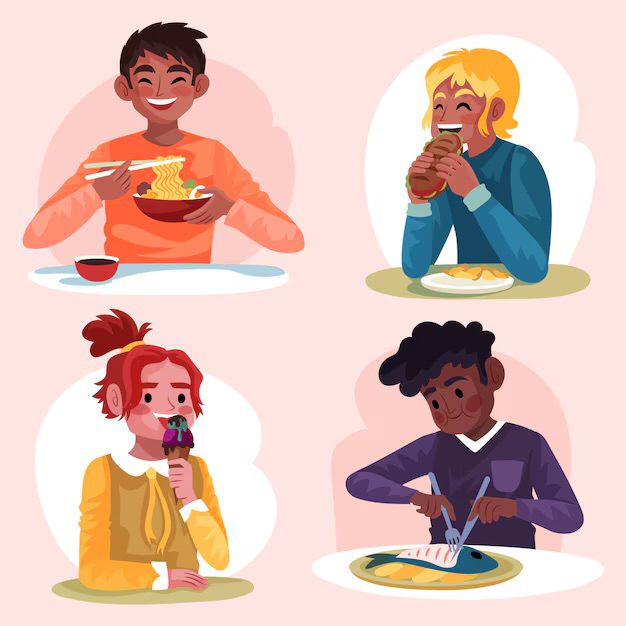This content is for informational and educational purposes only. Always consult a qualified healthcare provider.
Last Updated on October 2, 2024 by Grace Oluchi
Emotional eating is a complex behavior where a person uses food as a coping mechanism to get through a hard time. It can be for a moment, day or weeks. Studies have shown that emotional eating is linked to developing excess weight and difficulty losing weight.
Such a person uses food to manage, and regulate their emotions, rather than eating because they are physically hungry. They eat to feel better emotionally or mood-wise, but it is only temporary (a form of instant gratification). Additionally, It’s like you’re eating your feelings away, and randomly indulging for the wrong reasons.
However, by recognizing your emotions, and finding healthier coping alternatives, you can begin your healing process.
📋 Table of Contents
Causes of emotional eating
Common causes of emotional eating are:
1 . Stress and anxiety: When an emotional eater is stressed or anxious, they resort to food to cope with overwhelming emotions and pressures.
2 . Depression: A depressed person can use food as a temporary escape from sadness, underachievements, and hopelessness. That is, to feel better about their current status in life, they resort to eating.
3 . Low-self esteem: They usually eat to compensate for feelings of inadequacy or insecurity.
4 . Boredom: Due to lack of stimulation and activity, they decide to eat.
5 . Trauma: Because of a past experience which caused them to be traumatized (including from childhood), they associate food with comfort and emotional regulation.
6 . Social pressures: Societal beauty standards, media influence, and peer expectations, can cause emotional eating.
7 . Relationship issues: Relationship problems with a romantic partner, family members, or friends can lead to emotional eating, during to aftermath feelings of isolation.
8 . Hormonal changes: Fluctuations during menstruation, pregnancy, or menopause can induce emotional eating.
9 . Past dieting or food restrictions: A highly restrictive diet can cause a person to engage in rebel eating or food overindulgence.
10 . Mental health conditions: Depression, anxiety disorders, PTSD , can cause emotional eating.
Other contributing factors
- Genetics
- Lack of sleep
- Certain medications
- Nutritional deficiencies
- Fatigue ( using food as a energy booster or pick- me up)
Signs of emotional eating
There are several signs that you might be an emotional eater.
- You eat in response to your emotions (stress, sadness, boredom, anxiety).
- Mindless or automatic eating; sudden, urgent cravings.
- Eating when you’re not physically hungry.
- Craving only certain foods (likely unhealthy foods).
- Excessive eating; eating not to satisfy hunger but eating till you feel sick or overly full.
- Using food as a reward or punishment.
- Feeling guilty, regretful, or ashamed of yourself after eating.
- Hiding your eating habits from others.
How to stop emotional eating
There are many ways you can control yourself from eating emotionally. Though, there is no one-size fits all approach, there are some good rules to follow:
1 . Practice mindful eating techniques like eating and savoring the food you’re eating and really listening to your body’s fullness signs. Also, choose foods that are highly nutritious, such as eggs, salmon, mushrooms, and fortified milk.
See healthy foods to feed your brain
2 . Be mindful about what you buy and eat as certain foods are more likely to trigger emotional eating.
3. Choose healthy coping mechanisms such as arts and crafts, music, spending time with friends and family. Or seeking support from support groups, practicing relaxation techniques, engage in activities like reading, being with nature, or exploring hobbies.
4 . Have a balanced eating routine (variety, moderation), drink plenty of water, and get enough sleep (7 to 8 hours). Additionally, engage in self-care activities like self-massage, baths, and taking care of your skin.
5 . Pay attention to why you want to eat, the thoughts running through your head, and ask yourself if you’re hungry or not.
Bottom line
Emotional eating is a very normal coping mechanism in response to strong or intense feelings. It’s something known to man to eat to escape, numb, change or heighten feelings. Therefore, emotional eating is quite common as a good percentage of our eating is driven by emotions. In several cases we eat because we’re bored, unhappy, stressed or anxious. But it’s important to know when to draw the line or become intentional with our eating patterns. And that is by practicing strategies to curb emotional eating. These strategies are practicing mindful eating, choosing healthier ways to cope with hard times, picking healthy and satiating foods to eat.
We believe you’ll love these articles as well
Medspurs’ Pick: 6 Under 1000 Calorie Foods To Add To Your Diet.
Food Groups: Basics, Purpose and More.
Potassium rich foods to eat that aren’t bananas
Mindful eating : Uncovering the benefits and how it affects your life
Frequently Asked Questions
Does this mean I can’t celebrate something good by indulging in food?
No this doesn’t mean you can’t treat yourself to something in order to celebrate. Maybe you had a successful meeting, or finished a project, got the job, or even got a date. Treats are not a bad thing, but if you’re always using food as a means to curbing your suffering whether long term or short term, it can become a problem.
When does emotional eating become a problem?
Occasionally having too much of unhealthy foods isn’t detrimental, sometimes you just need some cookies or chocolate to feel better. However, it can become a problem when it happens a lot or it turns into your main coping mechanism. For instance, if your first and only way of coping when you’re feeling stressed is turning to food, that is when emotional eating becomes a problem or an issue.

